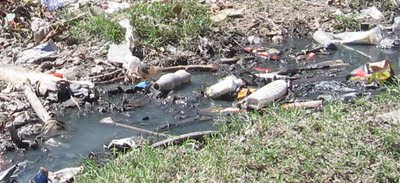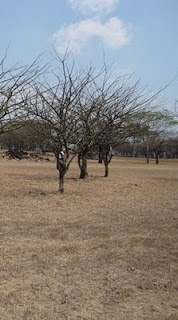Something to Think About
My trash gets picked up once a week. This is a luxury.
My family is pretty intense when it comes to trash. We reuse every piece of paper with a little blank space. We recycle every scrap of cardboard packaging and mail. We compost all of my organic kitchen waste. We use non-recyclables for art projects or other purposes. We free-cycle. Still, we put out a little bag of trash each week, and it is taken away, and we do not have to think much about it after that.
We hang out at a local church that tries to implement good trash practices too. It's a little more difficult in an urban environment, especially when recyclables do not get picked up regularly. But scrap metal is a source of income, and free-cycling is very easy with so many neighbors. The multiple bags of trash get picked up once a week, and this is a luxury.
In our sister church community in El Salvador, the luxury of trash collection and disposal does not exist. The people there do not have legal title to their land so community services have been difficult to secure. Trash is everywhere.
Some families try to compost, but with tiny plots around their homes and just a few plants which grow in the hard-pack dirt or in random containers, there is no soil to mix with the scraps and no desire to attract more insects or rodents. Some families recycle food scraps by feeding them to their dogs, cats, chickens and ducks. Stray dogs, in fact, are an asset to the community, cleaning up the edible trash from the pathways.
Some families have little buckets for garbage. They burn whatever will burn in their cooking fires, including lightweight plastic wrappers, which melt with pungent aromas under the tamale pots. The trash left behind is taken to the edges of the community and dumped onto the hillside next to the highway or dumped on the flat la nd at the bottom of the hill near what is known as "the dirty river." The dirty river is not really a river, but the accumulation of used water from laundry and bathing which runs through the little yards, watering the trees and satisfying the ducks, down the edges of the pathways to the bottom of the hill. There it rests as a murky creek of white foam and algae mixed with junk food wrappers and old shoes.
nd at the bottom of the hill near what is known as "the dirty river." The dirty river is not really a river, but the accumulation of used water from laundry and bathing which runs through the little yards, watering the trees and satisfying the ducks, down the edges of the pathways to the bottom of the hill. There it rests as a murky creek of white foam and algae mixed with junk food wrappers and old shoes.
Where do you put the trash when there is no place to put the trash?
One time, we had this idea to do a project with the youth in our sister community. Modeled after a kids' gardening and work program which helps to keep the city blocks around our local church clean, we launched a clean-up campaign in our Salvadoran community. We gave out gloves. We gave out buckets. We accompanied them on trash patrol. We did our best to at least get the trash into some designated areas. After several hours of work, the kids broke for a snack. The snack wrappers ended up on the ground. Old habits are hard to break, and when hours of cleaning don't seem to make a huge difference, well, what's the point?
Since that not-so-successful project day, the youth and the adults have been learning more about gardening in tiny spaces and more about the responsibility God places on people to care for his creation.
The community was able to get the government to install some trash bins along the highway. They are always beyond overflowing, and the neighborhood cows and horses still munch away at big nasty piles of trash which surround the bins, but the idea of placing trash in a designated place has taken hold. The pathways are a little less trashy. The youth are thinking about doing a clean-up project at the dirty river.
Back home, we have the luxury of watching our little bag of trash disappear every Monday. What if we had to deal with that little bag, and the next week's bag, and the spring cleaning bags, and the odd big stuff we pay to get rid of...what if all that trash had to stay in our yard and in our neighborhood. It's something to think about.
My family is pretty intense when it comes to trash. We reuse every piece of paper with a little blank space. We recycle every scrap of cardboard packaging and mail. We compost all of my organic kitchen waste. We use non-recyclables for art projects or other purposes. We free-cycle. Still, we put out a little bag of trash each week, and it is taken away, and we do not have to think much about it after that.
We hang out at a local church that tries to implement good trash practices too. It's a little more difficult in an urban environment, especially when recyclables do not get picked up regularly. But scrap metal is a source of income, and free-cycling is very easy with so many neighbors. The multiple bags of trash get picked up once a week, and this is a luxury.
In our sister church community in El Salvador, the luxury of trash collection and disposal does not exist. The people there do not have legal title to their land so community services have been difficult to secure. Trash is everywhere.
Some families try to compost, but with tiny plots around their homes and just a few plants which grow in the hard-pack dirt or in random containers, there is no soil to mix with the scraps and no desire to attract more insects or rodents. Some families recycle food scraps by feeding them to their dogs, cats, chickens and ducks. Stray dogs, in fact, are an asset to the community, cleaning up the edible trash from the pathways.
Some families have little buckets for garbage. They burn whatever will burn in their cooking fires, including lightweight plastic wrappers, which melt with pungent aromas under the tamale pots. The trash left behind is taken to the edges of the community and dumped onto the hillside next to the highway or dumped on the flat la
 nd at the bottom of the hill near what is known as "the dirty river." The dirty river is not really a river, but the accumulation of used water from laundry and bathing which runs through the little yards, watering the trees and satisfying the ducks, down the edges of the pathways to the bottom of the hill. There it rests as a murky creek of white foam and algae mixed with junk food wrappers and old shoes.
nd at the bottom of the hill near what is known as "the dirty river." The dirty river is not really a river, but the accumulation of used water from laundry and bathing which runs through the little yards, watering the trees and satisfying the ducks, down the edges of the pathways to the bottom of the hill. There it rests as a murky creek of white foam and algae mixed with junk food wrappers and old shoes.Where do you put the trash when there is no place to put the trash?
One time, we had this idea to do a project with the youth in our sister community. Modeled after a kids' gardening and work program which helps to keep the city blocks around our local church clean, we launched a clean-up campaign in our Salvadoran community. We gave out gloves. We gave out buckets. We accompanied them on trash patrol. We did our best to at least get the trash into some designated areas. After several hours of work, the kids broke for a snack. The snack wrappers ended up on the ground. Old habits are hard to break, and when hours of cleaning don't seem to make a huge difference, well, what's the point?
Since that not-so-successful project day, the youth and the adults have been learning more about gardening in tiny spaces and more about the responsibility God places on people to care for his creation.
The community was able to get the government to install some trash bins along the highway. They are always beyond overflowing, and the neighborhood cows and horses still munch away at big nasty piles of trash which surround the bins, but the idea of placing trash in a designated place has taken hold. The pathways are a little less trashy. The youth are thinking about doing a clean-up project at the dirty river.
Back home, we have the luxury of watching our little bag of trash disappear every Monday. What if we had to deal with that little bag, and the next week's bag, and the spring cleaning bags, and the odd big stuff we pay to get rid of...what if all that trash had to stay in our yard and in our neighborhood. It's something to think about.



Great food for thought, Linda. Makes me even more determined to be a good steward of this earth.
ReplyDeleteReality sometimes is cruel
ReplyDeleteThis is one of the hardest parts for me living in El Salvador. I used to get really annoyed with people and the lack of respect for their land, but I now know that it's more a lack of education. It's hard to know what to do in that situation because as you said "old habits die hard". I still yell at family members for throwing trash out the car window, but they just look at me as if I'm crazy!
ReplyDelete